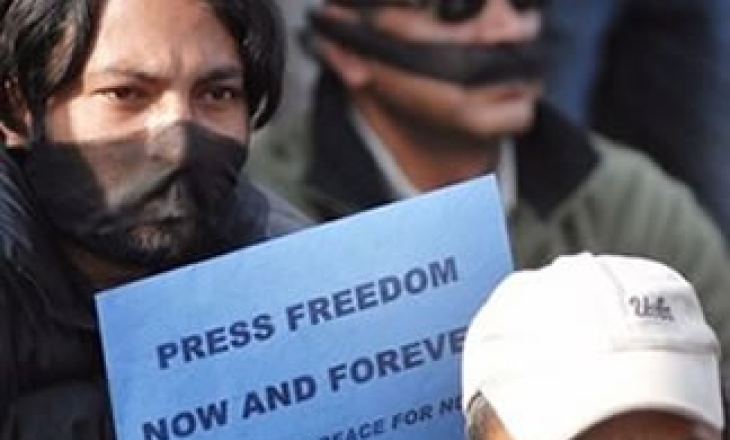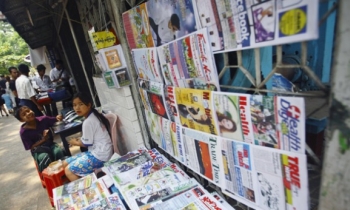A woman reporter who worked for a local radio station in a troubled region of southeast Nepal has been stabbed to death by a group of unidentified assailants. Uma Singh, also a member of a rights group, Women's Human Rights Defenders Network, Dhanusha, was attacked late on Sunday while she was sitting in her home in Janakpur, 98 km southeast of Kathmandu.
A group of 14 people attacked Singh, a 24-year-old print and radio reporter, in her home in the southeastern district of Dhanusha on Sunday night. Singh died of multiple stab wounds to the head and upper body while being transferred from a local hospital to a larger one later that evening, the New York-based Committee to Protect Journalists (CPJ) reported.
Brij Kumar Yadav, Singh's editor at the Nepali-language daily Janakpur Today, told Agence France-Presse (AFP) that her recent coverage of women's rights and local political issues could have been the cause of the attack.
The Kantipur news group also reported that its Dhanusha-based reporter Manika Jha was threatened in her home on Sunday by a group of three or four people who broke her windows and told her that she would be the next person to be attacked. Police provided a guard at her residence, according to the group's website, eKantipur.
Women journalists in Dhanusha demanded official protection in October 2008, claiming dozens had been forced to quit after threats from armed groups.
Sunday's attacks came just weeks after Prime Minister Pushpa Kamal Dahal publicly reaffirmed the government's commitment to protecting the press following an escalation of violent attacks on the media. News outlets raised an outcry after assailants struck the offices of the Himalmedia publishing company in December, with many newspapers leaving pages blank in protest.
"The violent death of our colleague Uma Singh is a tragedy and her attackers must be prosecuted," said Bob Dietz, CPJ Asia Programme Coordinator. "This killing should act as a wake-up call to the Maoist-led government. For too long Nepal has failed to respond to female journalists in the Terai region and their calls for much-needed protection."
“Our first thoughts are with her family and friends. We ask the authorities to react quickly and to do their utmost to protect journalists and quickly arrest the killers. This kind of appalling murder must not go unpunished if the Nepalese press is to go about its work freely," Paris-based Reporters sans Frontières (RSF) said.
The Federation of Nepalese Journalists (FNJ) condemned the attack and is sending a team to the spot to investigate the killing. Dharmendra Jha, the president of the organisation who was Uma Singh’s professor, said he was very shocked by what had happened. “She was my pupil and I encouraged her to go in for committed journalism,” he told satellite television CNN.
New York-based Human Rights Watch said that some of the attackers could be linked to the Communist Party of Nepal, the largest party in the ruling coalition, headed by Pushpa Kamal Dahal or "Prachanda", who led a Maoist rebellion for a decade before becoming prime minister.
“The brutal murder of Uma Singh and the attack against Manika Jha are chilling reminders of the extreme dangers and difficulties confronting a free and open media in Nepal,” International Federation of Journalists (IFJ) Asia-Pacific Director Jacqueline Park said. “Local authorities in Janakpur and the Government must launch an immediate and full investigation into Singh’s murder and the threats against Jha, and ensure the perpetrators are brought to justice.”
"Occuring amid a growing number of reports of incidents targeting journalists throughout Nepal, this tragedy should galvanise those responsible for protection of media freedom to take the necessary action to ensure the security of journalists," said Richard Bennett, representative of the UN High Commissioner for Human Rights in Nepal.
Singh also worked for the local FM station Radio Today. She opposed threats to women's rights—including the local tradition of costly dowries paid by the bride's family before marriage—and criticised political leaders involved in local unrest stemming from ethnic separatist movements, the reports said.
The local news website Republica reported on Monday that police had arrested four people in connection with Singh's murder. It quoted state-owned Nepal TV saying that a local political group had claimed responsibility for the slaying, saying it was committed "mistakenly." Other news outlets said the motive was still unknown.
Militant groups operating in the plains and low hills of the Terai advocate autonomy, and the region has seen outbreaks of violence since 2006, according to published analyses. Despite opening negotiations with some groups, the recently elected government, dominated by the Communist Party of Nepal, has failed to stem the aggression.
The Janakpur offices of the Terai Times were also attacked and staff assaulted on October 20 after the paper published articles alleging the Maoist's youth branch, the Young Communist League, was involved in local criminal activities, according to local and international news reports.
"It is a big problem working in the Terai region," Singh told the UN Mission in Nepal during an interview last year. "Society doesn't accept [women] with equal perspectives. They say the work we have been doing is not good." She also described pressures from local organizations and armed groups. "If we don't air the news of their choice, they threaten us with killing," she said. But, she said, she and her colleagues did not bow to their orders. "We also have to balance our news."










